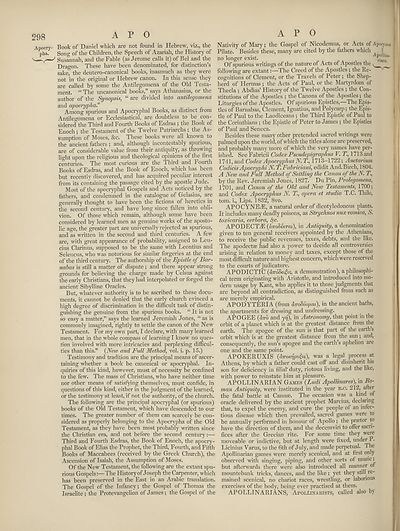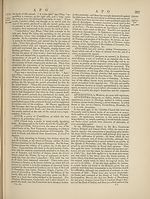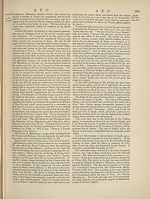Encyclopaedia Britannica > Volume 3, Anatomy-Astronomy
(306) Page 298
Download files
Complete book:
Individual page:
Thumbnail gallery: Grid view | List view

298
Apocry¬
pha.
A P O
Book of Daniel which are not found in Hebrew, viz., the
Song of the Children, the Speech of Azariah, the History of
Susannah, and the Fable (as Jerome calls it) of Bel and the
Dragon. These have been denominated, for distinction’s
sake, the deutero-canonical books, inasmuch as they were
not in the original or Hebrew canon. In this sense they
are called by some the Antilegomena of the Old Testa¬
ment. “ The uncanonical books,” says Athanasius, or the
author of the Synopsis, “ are divided into antilegomena
and apocrypha.” .
Among spurious and Apocryphal Books, as distinct from
Antilegomena or Ecclesiastical, are doubtless to be con-,
sidered the Third and Fourth Books of Esdras ; the Book of
Enoch ; the Testament of the Twelve Patriarchs ; the As¬
sumption of Moses, &c. These books were ad known to
the ancient fathers ; and, although incontestably spuiious,
are of considerable value from their antiquity, as throwing
light upon the religious and theological opinions of the first
centuries. The most curious are the I bird and Fourth
Books of Esdras, and the Book of Enoch, which has been
but recently discovered, and has acquired peculiar interest
from its containing the passage cited by the apostle Jude.
Most of the apocryphal Gospels and Acts noticed by the
fathers, and condemned in the catalogue of Gelasius, are
generally thought to have been the fictions of heretics in
the second century, and have long since fallen into obli¬
vion. Of those which remain, although some have been
considered by learned men as genuine works of the aposto¬
lic age, the greater part are universally rejected as spurious,
and as written in the second and third centuries. A few
are, with great appearance of probability, assigned to Leu-
cius Clarinus, supposed to be the same with Leontius and
Seleucus, who was notorious for similar forgeries at the end
of the third century. The authorship of the Epistle of Bar¬
nabas is still a matter of dispute ; and there appear strong
grounds for believing the charge made by Celsus against
the early Christians, that they had interpolated or forged the
ancient Sibylline Oracles.
But, whatever authority is to be ascribed to these docu¬
ments, it cannot be denied that the early church evinced a
high degree of discrimination in the difficult task of distin¬
guishing the genuine from the spurious books. “ It is not
so easy a matter,” says the learned Jeremiah Jones, “ as is
commonly imagined, rightly to settle the canon of the New
Testament. For my own part, I declare, with many learned
men, that in the whole compass of learning I know no ques¬
tion involved with more intricacies and perplexing difficul¬
ties than this.” {New and Full Method, vol. i. p. 15.)
Testimony and tradition are the principal means of ascer¬
taining whether a book be canonical or apocryphal. In¬
quiries of this kind, however, must of necessity be confined
to the few. The mass of Christians, who have neither time
nor other means of satisfying themselves, must confide, in
questions of this kind, either in the judgment of the learned,
or the testimony at least, if not the authority, of the church.
The following are the principal apocryphal (or spurious)
books of the Old Testament, which have descended to our
times. The greater number of them can scarcely be con¬
sidered as properly belonging to the Apocrypha of the Old
Testament, as they have been most probably written since
the Christian era, and not before the second century:—
Third and Fourth Esdras, the Book of Enoch, the apocry¬
phal Book of Elias the Prophet, the Third, Fourth, and Fifth
Books of Maccabees (received by the Greek Church), the
Ascension of Isaiah, the Assumption of Moses.
Of the New Testament, the following are the extant spu¬
rious Gospels:—The History of Joseph the Carpenter, which
has been preserved in the East in an Arabic translation.
The Gospel of the Infancy; the Gospel of Thomas the
Israelite; the Protevangelion of James; the Gospel of the
A P O
Nativity of Mary; the Gospel of Nicodemus, or Acts of Apocynes
Pilate. Besides these, many are cited by the fathers which I!
no longer exist. rians*
Of spurious writings of the nature of Acts of Apostles the y
following are extant:—The Creed of the Apostles ; the Re-
cognitions of Clement, or the Travels of Peter; the Shep¬
herd of Hermas; the Acts of Paul, or the Martyrdom of
Thecla ; Abdias’ History of the Twelve Apostles ; the Con¬
stitutions of the Apostles ; the Canons of the Apostles; the
Liturgies of the Apostles. Of spurious Epistles,—The Epis¬
tles of Barnabas, Clement, Ignatius, and Polycarp; the Epis¬
tle of Paul to the Laodiceans ; the Third Epistle of Paul to
the Corinthians ; the Epistle of Peter to James; the Epistles
of Paul and Seneca.
Besides these many other pretended sacred writings were
palmed upon the world, of which the titles alone are preserved,
and probably many more of which the very names have per¬
ished. See Fabricii Codex Pseudepigraphus V. 71,1713 and
1741,and CodexApocryphusNT., 1713-1722; Auctarium
Codicis Apocryphi N. T.Fabriciani, edidit And. Birch, 1804.
A New and Full Method of Settling the Canon of the N. T.,
by the Rev. Jeremiah Jones, 1827. Du Pin, Prolegomena,
1701, and Canon of the Old and New Testaments, 1700;
and Codex Apocryphus N. T., opera et studio T.C. Thilo,
tom. i., Lips. 1832, 8vo.
APOCYNEiE, a natural order of dicotyledonous plants.
It includes many deadly poisons, as Strychnos nux vomica, S.
toxicaria, cerbora, fyc.
APODECT^E (aTroSeVrai), in Antiquity, a denomination
given to ten general receivers appointed by the Athenians,
to receive the public revenues, taxes, debts, and the like.
The apodectae had also a power to decide all controversies
arising in relation to money and taxes, except those of the
most difficult nature and highest concern, which were reserved
to the courts of judicature.
APODICTIC (ttTroSaAs, a demonstration), a philosophi¬
cal term originating with Aristotle, and introduced into mo¬
dern usage by Kant, who applies it to those judgments that
are beyond all contradiction, as distinguished from such as
are merely empirical.
APODYTERIA (from airo^vopai), in the ancient baths,
the apartments for dressing and undressing.
APOGEE (cbro and yf), in Astronomy, that point in the
orbit of a planet which is at the greatest distance from the
earth. The apogee of the sun is that part of the earth s
orbit which is at the greatest distance from the sun; and,
consequently, the sun’s apogee and the earth’s aphelion are
one and the same point.
APOKERUXIS {aTTOKrjpvfc), was a legal process at
Athens, by which a father could cast off and disinherit his
son for deficiency in filial' duty, riotous living, and the like,
with power to reinstate him at pleasure.
APOLLINARIAN Games {Ludi Apollinares), in Ro¬
man Antiquity, were instituted in the year b.c. 212, after
the fatal battle at Cannae. The occasion was a kind of
oracle delivered by the ancient prophet Marcius, declaring
that, to expel the enemy, and cure the people of an infec¬
tious disease which then prevailed, sacred games were to
be annually performed in honour of Apollo ; the praetor to
have the direction of them, and the decemviri to offer sacri¬
fices after the Grecian rite. For some time they were
moveable or indictive, but at length were fixed, under P.
Licinius Varus, to the 6th of July, and made perpetual. The
Apollinarian games were merely scenical, and at first only
observed with singing, piping, and other sorts of music;
but afterwards there were also introduced all manner of
mountebank tricks, dances, and the like ; yet they still re¬
mained scenical, no chariot races, wrestling, or laborious
exercises of the body, being ever practised at them.
APOLLINARIANS, ApolLinarists, called also by
Apocry¬
pha.
A P O
Book of Daniel which are not found in Hebrew, viz., the
Song of the Children, the Speech of Azariah, the History of
Susannah, and the Fable (as Jerome calls it) of Bel and the
Dragon. These have been denominated, for distinction’s
sake, the deutero-canonical books, inasmuch as they were
not in the original or Hebrew canon. In this sense they
are called by some the Antilegomena of the Old Testa¬
ment. “ The uncanonical books,” says Athanasius, or the
author of the Synopsis, “ are divided into antilegomena
and apocrypha.” .
Among spurious and Apocryphal Books, as distinct from
Antilegomena or Ecclesiastical, are doubtless to be con-,
sidered the Third and Fourth Books of Esdras ; the Book of
Enoch ; the Testament of the Twelve Patriarchs ; the As¬
sumption of Moses, &c. These books were ad known to
the ancient fathers ; and, although incontestably spuiious,
are of considerable value from their antiquity, as throwing
light upon the religious and theological opinions of the first
centuries. The most curious are the I bird and Fourth
Books of Esdras, and the Book of Enoch, which has been
but recently discovered, and has acquired peculiar interest
from its containing the passage cited by the apostle Jude.
Most of the apocryphal Gospels and Acts noticed by the
fathers, and condemned in the catalogue of Gelasius, are
generally thought to have been the fictions of heretics in
the second century, and have long since fallen into obli¬
vion. Of those which remain, although some have been
considered by learned men as genuine works of the aposto¬
lic age, the greater part are universally rejected as spurious,
and as written in the second and third centuries. A few
are, with great appearance of probability, assigned to Leu-
cius Clarinus, supposed to be the same with Leontius and
Seleucus, who was notorious for similar forgeries at the end
of the third century. The authorship of the Epistle of Bar¬
nabas is still a matter of dispute ; and there appear strong
grounds for believing the charge made by Celsus against
the early Christians, that they had interpolated or forged the
ancient Sibylline Oracles.
But, whatever authority is to be ascribed to these docu¬
ments, it cannot be denied that the early church evinced a
high degree of discrimination in the difficult task of distin¬
guishing the genuine from the spurious books. “ It is not
so easy a matter,” says the learned Jeremiah Jones, “ as is
commonly imagined, rightly to settle the canon of the New
Testament. For my own part, I declare, with many learned
men, that in the whole compass of learning I know no ques¬
tion involved with more intricacies and perplexing difficul¬
ties than this.” {New and Full Method, vol. i. p. 15.)
Testimony and tradition are the principal means of ascer¬
taining whether a book be canonical or apocryphal. In¬
quiries of this kind, however, must of necessity be confined
to the few. The mass of Christians, who have neither time
nor other means of satisfying themselves, must confide, in
questions of this kind, either in the judgment of the learned,
or the testimony at least, if not the authority, of the church.
The following are the principal apocryphal (or spurious)
books of the Old Testament, which have descended to our
times. The greater number of them can scarcely be con¬
sidered as properly belonging to the Apocrypha of the Old
Testament, as they have been most probably written since
the Christian era, and not before the second century:—
Third and Fourth Esdras, the Book of Enoch, the apocry¬
phal Book of Elias the Prophet, the Third, Fourth, and Fifth
Books of Maccabees (received by the Greek Church), the
Ascension of Isaiah, the Assumption of Moses.
Of the New Testament, the following are the extant spu¬
rious Gospels:—The History of Joseph the Carpenter, which
has been preserved in the East in an Arabic translation.
The Gospel of the Infancy; the Gospel of Thomas the
Israelite; the Protevangelion of James; the Gospel of the
A P O
Nativity of Mary; the Gospel of Nicodemus, or Acts of Apocynes
Pilate. Besides these, many are cited by the fathers which I!
no longer exist. rians*
Of spurious writings of the nature of Acts of Apostles the y
following are extant:—The Creed of the Apostles ; the Re-
cognitions of Clement, or the Travels of Peter; the Shep¬
herd of Hermas; the Acts of Paul, or the Martyrdom of
Thecla ; Abdias’ History of the Twelve Apostles ; the Con¬
stitutions of the Apostles ; the Canons of the Apostles; the
Liturgies of the Apostles. Of spurious Epistles,—The Epis¬
tles of Barnabas, Clement, Ignatius, and Polycarp; the Epis¬
tle of Paul to the Laodiceans ; the Third Epistle of Paul to
the Corinthians ; the Epistle of Peter to James; the Epistles
of Paul and Seneca.
Besides these many other pretended sacred writings were
palmed upon the world, of which the titles alone are preserved,
and probably many more of which the very names have per¬
ished. See Fabricii Codex Pseudepigraphus V. 71,1713 and
1741,and CodexApocryphusNT., 1713-1722; Auctarium
Codicis Apocryphi N. T.Fabriciani, edidit And. Birch, 1804.
A New and Full Method of Settling the Canon of the N. T.,
by the Rev. Jeremiah Jones, 1827. Du Pin, Prolegomena,
1701, and Canon of the Old and New Testaments, 1700;
and Codex Apocryphus N. T., opera et studio T.C. Thilo,
tom. i., Lips. 1832, 8vo.
APOCYNEiE, a natural order of dicotyledonous plants.
It includes many deadly poisons, as Strychnos nux vomica, S.
toxicaria, cerbora, fyc.
APODECT^E (aTroSeVrai), in Antiquity, a denomination
given to ten general receivers appointed by the Athenians,
to receive the public revenues, taxes, debts, and the like.
The apodectae had also a power to decide all controversies
arising in relation to money and taxes, except those of the
most difficult nature and highest concern, which were reserved
to the courts of judicature.
APODICTIC (ttTroSaAs, a demonstration), a philosophi¬
cal term originating with Aristotle, and introduced into mo¬
dern usage by Kant, who applies it to those judgments that
are beyond all contradiction, as distinguished from such as
are merely empirical.
APODYTERIA (from airo^vopai), in the ancient baths,
the apartments for dressing and undressing.
APOGEE (cbro and yf), in Astronomy, that point in the
orbit of a planet which is at the greatest distance from the
earth. The apogee of the sun is that part of the earth s
orbit which is at the greatest distance from the sun; and,
consequently, the sun’s apogee and the earth’s aphelion are
one and the same point.
APOKERUXIS {aTTOKrjpvfc), was a legal process at
Athens, by which a father could cast off and disinherit his
son for deficiency in filial' duty, riotous living, and the like,
with power to reinstate him at pleasure.
APOLLINARIAN Games {Ludi Apollinares), in Ro¬
man Antiquity, were instituted in the year b.c. 212, after
the fatal battle at Cannae. The occasion was a kind of
oracle delivered by the ancient prophet Marcius, declaring
that, to expel the enemy, and cure the people of an infec¬
tious disease which then prevailed, sacred games were to
be annually performed in honour of Apollo ; the praetor to
have the direction of them, and the decemviri to offer sacri¬
fices after the Grecian rite. For some time they were
moveable or indictive, but at length were fixed, under P.
Licinius Varus, to the 6th of July, and made perpetual. The
Apollinarian games were merely scenical, and at first only
observed with singing, piping, and other sorts of music;
but afterwards there were also introduced all manner of
mountebank tricks, dances, and the like ; yet they still re¬
mained scenical, no chariot races, wrestling, or laborious
exercises of the body, being ever practised at them.
APOLLINARIANS, ApolLinarists, called also by
Set display mode to:
![]() Universal Viewer |
Universal Viewer | ![]() Mirador |
Large image | Transcription
Mirador |
Large image | Transcription
Images and transcriptions on this page, including medium image downloads, may be used under the Creative Commons Attribution 4.0 International Licence unless otherwise stated. ![]()
| Encyclopaedia Britannica > Encyclopaedia Britannica > Volume 3, Anatomy-Astronomy > (306) Page 298 |
|---|
| Permanent URL | https://digital.nls.uk/193761326 |
|---|
| Attribution and copyright: |
|
|---|---|
| Shelfmark | EB.16 |
|---|---|
| Description | Ten editions of 'Encyclopaedia Britannica', issued from 1768-1903, in 231 volumes. Originally issued in 100 weekly parts (3 volumes) between 1768 and 1771 by publishers: Colin Macfarquhar and Andrew Bell (Edinburgh); editor: William Smellie: engraver: Andrew Bell. Expanded editions in the 19th century featured more volumes and contributions from leading experts in their fields. Managed and published in Edinburgh up to the 9th edition (25 volumes, from 1875-1889); the 10th edition (1902-1903) re-issued the 9th edition, with 11 supplementary volumes. |
|---|---|
| Additional NLS resources: |
|

